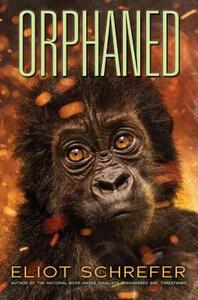Take a photo of a barcode or cover
Review soon to be posted at WASHYARG: https://evergreenbookaward.org/washyarg/washyarg-reviews/
I had not read any of the other three titles in this quartet, but it did not impact my enjoyment of the fourth book.
I had not read any of the other three titles in this quartet, but it did not impact my enjoyment of the fourth book.
Thank you @kidlitexchange #partner for providing me with a copy of this book. All opinions are my own.
⭐️⭐️⭐️⭐️/5 stars for this gem! The story takes place in the paleolithic era, in a time when early humans will come in contact with gorillas for the first time. This story was written in verse, from the point of view of the young female gorilla, Snub. Her family group is displaced by a volcanic eruption. Snub’s sense of independence and curiosity drives her to look beyond her gorilla group and make some difficult decisions. When she discovers a “not gorilla” that walks on two legs and was abandoned by her family, Snub takes her in. The dynamic between these two, as well as Snub’s youngest sibling, makes you think about how powerful of a connection you can make, even if it is an unspoken one.
I really enjoyed this beautiful story. The fact that it took place at such an interesting and turbulent time in history peaked my curiosity. I think Schrefer did an amazing job with the development of Snub and loved the choice to write in verse. The short phrases created a visual imagery for me that made sense for a gorilla. This is the first book I have read in this series and it did not disappoint. I will definitely pick up the other three. I would recommend this for middle school and higher. However, I also think some of my fifth graders could definitely handle the content and would love the series as well.
This is very, very different from the other Ape books by Eliot Schrefer, but if you're worried that it won't make you cry because humans mostly suck so bad, never fear! I full on sobbed at work because of how depressed it made me. Why can't human beings be more like gorillas-only take what we need, leave other animals and their homes alone? Anyhow, I hope I didn't put you off reading this book. It's really good! And like Schrefer says in the interview at the end, humans aren't just jerks. We're also the species that can totally save gorillas if we just get it together. So if you want to be inspired to save gorillas, this is a good place to start.
What a fascinating book! Orphaned is so different than Schrefer’s other novels but in a way that is new and so well done. Where Endangered, Rescued, and Threatened were about humans interacting with apes in a contemporary setting, Orphaned is about apes interacting with early humans in a pre-historic setting. There is no book like this! And it is done beautifully.
When we visited virtually with Eliot Schrefer he shared with us that the story was originally told in prose but his editor, David Levithan, pointed out to him that apes, though intelligent, would not think the way that Eliot writes prose. That their thoughts would be focused on immediate needs and would lack in descriptive and fluffy language. He then completely rewrote the story in verse and WOW! Snub’s voice is perfect.
While I originally thought that the point of view and setting would make the story a challenge, but it was the contrary–it made it just that more interesting!
Full review with teaching tools: http://www.unleashingreaders.com/?p=17450
When we visited virtually with Eliot Schrefer he shared with us that the story was originally told in prose but his editor, David Levithan, pointed out to him that apes, though intelligent, would not think the way that Eliot writes prose. That their thoughts would be focused on immediate needs and would lack in descriptive and fluffy language. He then completely rewrote the story in verse and WOW! Snub’s voice is perfect.
While I originally thought that the point of view and setting would make the story a challenge, but it was the contrary–it made it just that more interesting!
Full review with teaching tools: http://www.unleashingreaders.com/?p=17450
Orphaned is a unique final installment to the ape series. Told in verse, the story follows the interaction of gorillas and man before human history. I loved Snub's story arc. Be prepared to laugh & cry.
When I started this book, I described it as a talking animal story, but that turned out to be wrong. Even when they're very realistic, the animals in those stories aren't true animals. This book was about true animals; it was about gorillas living in prehistoric times. Told (experienced?) though the eyes of Snub, a young female gorilla.
There isn't much plot to describe. Early in the story, a volcano explodes and so Snub's family group has to relocate. Late in the story, they encounter not-gorillas (early humans). Mostly it was about how gorillas live in the natural world.
I completely believed Snub's voice. Her thoughts, behaviors, and interactions felt completely true to me. The author included repeated use of four gorilla noises (each noise defined in the header of chapter one). Like hoo meant peacefulness. mrgh meant readiness to attack. The four word sounds were used extensively through the story and really helped with the feel of it.
The author did another great trick: The header of each chapter had a little illustration telling you which gorillas were in it. I quickly enough learned to glance at it and check to see who would be there. At the end of the book, the author explained he did that on purpose, to give the reader the same awareness that a gorilla would have of its family.
If this was such a perfect animal book, why did I rate it a liked instead of loved? Two reasons:
1: There was basically no plot. About a third of the way in I was bored and ready to move on to something else. It was very good, but without an overarching story, I didn't feel driven to continue.
2: The larger issue. It was written in prose. Freeform poetry. I'll open to a random page and quote how it looks.
Skitter-scatter of rocks
shards tumbling into the canyon,
sending the gorillas clutching one
another--
except Silverback,
up on two legs and roaring.
Sharp line the ledge above.
Darting, grunting.
Maybe these are new gorillas.
Silverback beats his chest,
wragh.
When I first started the book, I spent so much time troubleshooting it and my Kindle. I thought something was making the lines break oddly.
Is prose nice? Does it fit in this story? Yes! But it was way, way, way too disruptive to read a whole book in it. I couldn't get lost in the story at all, because I never lost awareness of the writing.
I did save a quote I loved:
The little body in her aching arms is
the courage she needs.
Is this a good book? For sure! It's really well written and a great read! I just wish I had enjoyed it more.
There isn't much plot to describe. Early in the story, a volcano explodes and so Snub's family group has to relocate. Late in the story, they encounter not-gorillas (early humans). Mostly it was about how gorillas live in the natural world.
I completely believed Snub's voice. Her thoughts, behaviors, and interactions felt completely true to me. The author included repeated use of four gorilla noises (each noise defined in the header of chapter one). Like hoo meant peacefulness. mrgh meant readiness to attack. The four word sounds were used extensively through the story and really helped with the feel of it.
The author did another great trick: The header of each chapter had a little illustration telling you which gorillas were in it. I quickly enough learned to glance at it and check to see who would be there. At the end of the book, the author explained he did that on purpose, to give the reader the same awareness that a gorilla would have of its family.
If this was such a perfect animal book, why did I rate it a liked instead of loved? Two reasons:
1: There was basically no plot. About a third of the way in I was bored and ready to move on to something else. It was very good, but without an overarching story, I didn't feel driven to continue.
2: The larger issue. It was written in prose. Freeform poetry. I'll open to a random page and quote how it looks.
Skitter-scatter of rocks
shards tumbling into the canyon,
sending the gorillas clutching one
another--
except Silverback,
up on two legs and roaring.
Sharp line the ledge above.
Darting, grunting.
Maybe these are new gorillas.
Silverback beats his chest,
wragh.
When I first started the book, I spent so much time troubleshooting it and my Kindle. I thought something was making the lines break oddly.
Is prose nice? Does it fit in this story? Yes! But it was way, way, way too disruptive to read a whole book in it. I couldn't get lost in the story at all, because I never lost awareness of the writing.
I did save a quote I loved:
The little body in her aching arms is
the courage she needs.
Is this a good book? For sure! It's really well written and a great read! I just wish I had enjoyed it more.
3.5 stars
This novel in verse is the final book that Schrefer has written about the great apes. This one focuses on gorillas and is very different from the previous novels, not just because of the poetry format.
Snub is a young gorilla living with her extended family unit. The time is about 600,000 years ago and it takes place in what will be known as central eastern Africa. Things for Snub are changing rapidly as new creatures who walk on two legs are starting to invade the jungle - and they are inflicting a lot of damage on the jungle and on her family.
In addition to the challenge of reading a novel in verse there are also gorilla vocalizations interspersed throughout. There are pictograms of which family members are included in each chapter. The story is a sweet but sad one.
As always, Schrefer has done thorough research and has included Q&A at the back as well as references for additional reading and research.
This novel in verse is the final book that Schrefer has written about the great apes. This one focuses on gorillas and is very different from the previous novels, not just because of the poetry format.
Snub is a young gorilla living with her extended family unit. The time is about 600,000 years ago and it takes place in what will be known as central eastern Africa. Things for Snub are changing rapidly as new creatures who walk on two legs are starting to invade the jungle - and they are inflicting a lot of damage on the jungle and on her family.
In addition to the challenge of reading a novel in verse there are also gorilla vocalizations interspersed throughout. There are pictograms of which family members are included in each chapter. The story is a sweet but sad one.
As always, Schrefer has done thorough research and has included Q&A at the back as well as references for additional reading and research.
This imagined prehistory is undeniably the crowning achievement in Schrefer’s ape quartet, at once brimming with hope and loss, love and cruelty, constantly challenging the reader to question—in 600,000 years—how much and how little we’ve evolved.
My full review is posted at Ecolitbooks.com.
My full review is posted at Ecolitbooks.com.



